List of official languages by state
This is a complete list of the official languages designated in the sovereign states of the world. It includes all languages that have official language status either statewide or in a part of the state, or that have status as a national language, regional language, or minority language.
Only states, which are defined as sovereign, internationally recognised, independent political entities, are listed. This is not a list of countries or nations, although many states listed are simultaneously also countries and/or nations.
For dependent territories, refer to the corresponding sovereign states.
Definitions
- Official language: one designated as having a unique legal status in the state, typically, the language used in a nation's legislative bodies, and often, official government business
- Regional language: one designated as having official status limited to a specific area, administrative division, or territory of the state (on this page a regional language will have parentheses next to it that contain a region, province, etc. where the language has regional status)
- Minority language: (as used here) one spoken by a minority population within the state and officially designated as such; typically afforded protection and designated an officially permissible language for legal and government business in a specific area or territory of the state (on this page a minority language will be followed by parentheses that identify its minority status)
- National language: one that uniquely represents the national identity of a state, nation, and/or country and so designated by a country's government; some are technically minority languages (on this page a national language will be followed by parentheses that identify it as a national language status). Some countries have more than one language with this status
A
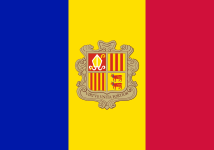 Andorra (Languages of Andorra)[4]
Andorra (Languages of Andorra)[4]
- Catalan
- Spanish (minority language)
- Portuguese (minority language)
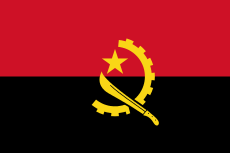 Angola[5]
Angola[5]
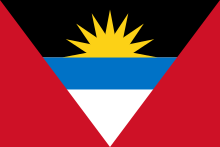 Antigua and Barbuda
Antigua and Barbuda
- English (de facto official)[6]
 Argentina
Argentina
- Spanish (de facto)
- Guaraní (co-official in Corrientes Province)[7]
- Kom, Moqoit and Wichi (co-official in Chaco Province)
 Austria
Austria
- German (official statewide)[9]
- Croatian (official in Burgenland in areas with a Croat minority)[10] (statewide minority language)
- Slovene (official in Carinthia and Styria in areas with a Slovene minority)[10] (statewide minority language)
- Czech (statewide minority language)
- Hungarian (in Burgenland) (statewide minority language)
- Slovak (statewide minority language)
- Romani (statewide minority language)
 Azerbaijan
Azerbaijan
- Azerbaijani[11]
- Armenian (Nagorno-Karabagh)
B
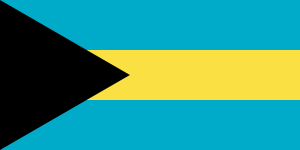 Bahamas
Bahamas
- English
 Bahrain
Bahrain
- Arabic
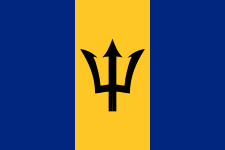 Barbados
Barbados
- English
 Belarus
Belarus
- Belarusian
- Russian
.svg.png) Belgium (Languages of Belgium)[12]
Belgium (Languages of Belgium)[12]
- Dutch (Official only in Flanders and Brussels)
- French (Official only in Brussels and in Wallonia, though not in the German-speaking Community of Belgium)
- German (Official only in the German-speaking Community of Belgium)
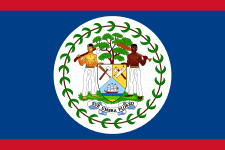 Belize
Belize
- English (Official language)
- Kriol (the lingua franca)
- Spanish (Minority language spoken on the border with Mexico and Guatemala)
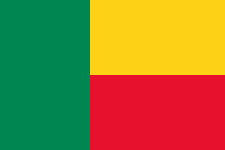 Benin
Benin
- French
 Bhutan
Bhutan
- Dzongkha
 Brazil
Brazil
- Portuguese (national, all cities)
- German (in Pomerode,[14] Santa Catarina)
- Pomeranian (in Pancas[15][16] and Santa Maria de Jetibá,[17] in Espírito Santo)
- Hunsrückisch (in Antônio Carlos, Santa Catarina)[18]
- Talian (in Serafina Corrêa, Rio Grande do Sul, Dialect of the Venetian Language)[19]
- Nheengatu, Baniwa and Tucano (in São Gabriel da Cachoeira, Amazonas)[20][21]
- Guarani (in Tacuru, Mato Grosso do Sul)[22]
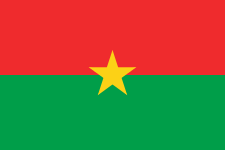 Burkina Faso
Burkina Faso
- French
- Fula (national)
- Jula (national)
- More (national)
C
 Canada
Canada
- English (federal; de jure official language)
- De jure official language in the provinces and territories of Manitoba, New Brunswick, the Northwest Territories, Nunavut and the Yukon.
- French (federal; de jure official language)
- De jure official language for the provinces and territories of Manitoba, New Brunswick, the Northwest Territories, Nunavut, Quebec and the Yukon.
- Chipewyan (regional; de jure official language in the Northwest Territories)
- Cree (regional; de jure official language in the Northwest Territories)
- Gwich’in (regional; de jure official language in the Northwest Territories)
- Inuinnaqtun (regional; de jure official language in the Northwest Territories and Nunavut)
- Inuktitut (regional; de jure official language in the Northwest Territories and Nunavut)
- Inuvialuktun (regional; de jure official language in the Northwest Territories)
- North Slavey (regional; de jure official language in the Northwest Territories)
- South Slavey (regional; de jure official language in the Northwest Territories)
- Tłı̨chǫ (regional; de jure official language in the Northwest Territories)
- English (federal; de jure official language)
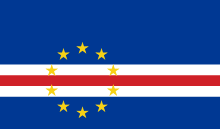 Cape Verde
Cape Verde
- Portuguese (official)
- Cape Verdean Creole (national)
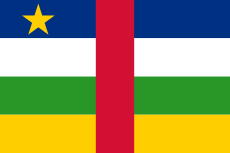 Central African Republic
Central African Republic
- French
- Sango (national)
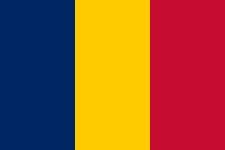 Chad
Chad
- Arabic
- French
 Chile
Chile
- No official language, Spanish is the de facto official language. (the languages and dialects of ethnic groups are also official in their territories[23])
 China
China
- Standard Chinese (statewide)
- Bai (in Dali, Lanping, Yunnan)
- Blang (in Shuangjiang, Yunnan)
- Bonan (in Jishishan, Gansu)
- Cantonese (de facto in Guangdong Province; official in Hong Kong and Macau)
- Daur (in Morin Dawa, Inner Mongolia; Meilisi Daur District, Heilongjiang)
- Derung (in Gongshan, Yunnan)
- Dong (in Sanjiang, Guangxi; Qiandongnan, Yuping, Guizhou; Jingzhou, Tongdao, Xinhuang, Zhijiang, Hunan)
- Dongxiang (Santa) (in Dongxiang, Jishishan, Gansu)
- Evenki (in Evenk Autonomous Banner, Evenk Ethnic Sumu, Inner Mongolia)
- English (official in Hong Kong)
- Gelao (Klau) (in Daozhen, Wuchuan, Guizhou)
- Hani (in Honghe, Jiangcheng, Mojiang, Ning'er, Yuanjiang, ZhenyuanYunnan)
- Hlai (Li) (in Baisha, Baoting, Changjiang, Ledong, Lingshui, Qiongzhong, Hainan)
- Hmong (Miao) (in Pengshui, Xiushan, Youyang, Chongqing; Chetian, Liangshui, Rongshui, Guangxi; Daozhen, Guanling, Qiandongnan, Qiannan, Qianxinan, Songtao, Weining, Wuchuan, Yinjiang, Zhenning, Ziyun, Guizhou; Baoting, Qiongzhong, Hainan; Enshi, Hubei; Chengbu, Jingzhou, Mayang, Xiangxi, Hunan; Jinping, Luquan, Pingbian, Wenshan, Yunnan)
- Jingpho (Kachin) (in Dehong, Yunnan)
- Jino (in Jinuoshan, Yunnan)
- Kazakh (in Aksai, Gansu; Barkol, Ili, Mori, Xinjiang)
- Kyrgyz (in Kizilsu, Xinjiang)
- Korean (in Changbai, Yanbian, Jilin)
- Lahu (in Lancang, Menglian, Shuangjiang, Zhenyuan, Yunnan)
- Lisu (in Sudian, Weixi, Yunnan)
- Maonan (Anan) (in Huanjiang, Guangxi)
- Mongolian (in Subei, Gansu; Weichang, Hebei; Dorbod, Heilongjiang; Inner Mongolia; Qian Gorlos, Jilin; Fuxin, Harqin, Liaoning; Haixi, Henan, Qinghai; Bayingolin, Bortala, Hoboksar, Xinjiang)
- Monguor (in Datong, Huzhu, Minhe, Qinghai)
- Monpa (in Gongri, Jiba, Lebuqule, Mama, Pailong, Tibet)
- Mulam (in Guzhai, Luocheng, Guangxi)
- Nanai (Hezhen) (in Bacha, Jiejinkou, Sipai, Heilongjiang)
- Naxi (Nakhi) (in Yulong, Yunnan)
- Ngac'ang (Achang) (in Husa, Jiubao, Nangsong, Yunnan)
- Nu (in Gongshan, Yunnan; not a specific language)
- Nuosu (Yi) (in Weining, Guizhou; Ebian, Liangshan, Mabian, Sichuan; Chuxiong, Eshan, Honghe, Jiangcheng, Jingdong, Jinggu, Luquan, Nanjian, Ninger, Ninglang, Shilin, Weishan, Xinping, Yangbi, Yuanjiang, Zhenyuan, Yunnan)
- Oroqen (in Greater Khingan, Oroqin Shibazhan, Inner Mongolia)
- Palaung (De'ang) (in Santaishan, Yunnan)
- Portuguese (in Macau)
- Pumi (in Lanping, Yunnan)
- Russian (in Shiwei, Inner Mongolia)
- Qiangic (in Beichuan, Ngawa, Sichuan)
- Salar (in Jishishan, Gansu; Xunhua, Qinghai)
- Sarikoli (Tajik) (in Tashkurgan, Xinjiang)
- She (in Jingning, Zhejiang)
- Sui (in Sandu, Guizhou)
- Tatar (in Daquan, Xinjiang)
- Tibetan (in Gannan, Tianzhu, Gansu; Guoluo, Haibei, Hainan, Haixi, Huangnan, Yushu, Qinghai; Garzê, Muli, Ngawa, Sichuan; Tibet; Diqing, Yunnan)
- Tujia (in Pengshui, Shizhu, Xiushan, Youyang, Chongqing; Yanhe, Yinjiang, Guizhou; Changyang, Enshi, Wufeng, Hubei; Xiangxi, Hunan)
- Uzbek (in Da'nan'gou, Xinjiang)
- Uyghur (in Xinjiang)
- Va (in Cangyuan, Gengma, Menglian, Shuangjiang, Ximeng, Yunnan)
- Vietnamese (in Jinping, Xiajiang, Jiangxi)
- Xibe (in Qapqal, Xinjiang)
- Yugur (Western, Eastern) (in Sunan, Gansu)
- Zhuang (in Lianshan, Guangdong; Guangxi; Wenshan, Yunnan)
 Colombia
Colombia
- Spanish (the languages and dialects of ethnic groups are also official in their territories[24])
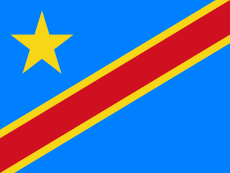 Democratic Republic of the Congo
Democratic Republic of the Congo
- French
- Lingala (national)
- Kikongo (national)
- Swahili (national)
- Tshiluba (national)
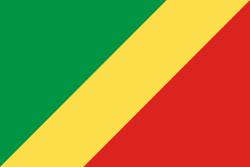 Republic of the Congo
Republic of the Congo
- French
- Lingala (national)
- Munukutuba (national)
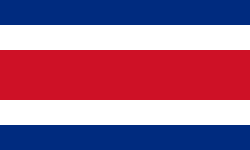 Costa Rica
Costa Rica
- Spanish
 Cuba
Cuba
- Spanish
 Czech Republic
Czech Republic
- Czech
- Slovak[27]
- Belorussian (minority language)[28]
- Bulgarian (minority language)[28]
- Croatian (minority language)[28]
- German (minority language)[28]
- Greek (minority language)[28]
- Hungarian (minority language)[28]
- Polish (minority language)[28]
- Romani (minority language)[28]
- Russian (minority language)[28]
- Rusyn (minority language)[28]
- Serbian (minority language)[28]
- Ukrainian (minority language)[28]
- Vietnamese (minority language)[28]
D
 Denmark
Denmark
- Danish (statewide)
- Faroese (in the Faroe Islands)
- German (protected minority language in Southern Jutland)
- Kalaallisut (in Greenland)
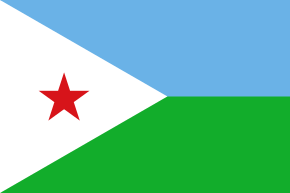 Djibouti
Djibouti
- Arabic
- French
- Somalian
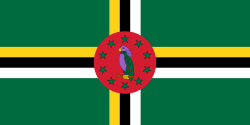 Dominica
Dominica
- English
 Dominican Republic
Dominican Republic
- Spanish
E
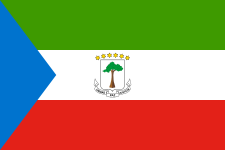 Equatorial Guinea
Equatorial Guinea
- Spanish
- French
- Portuguese
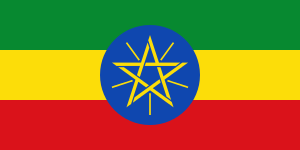 Ethiopia
Ethiopia
- Amharic (working language)
- Oromifa (working language)
- Somali (working language)
- Tigrigna (working language)
- Gurage (working language)
- Afar (working language)
- Wolayta (working language)
- Sidama (working language)
- Gedeo (working language)
- Kembata (working language)
- Hadiya (working language)
- Kunama (working language)
- Gambella (working language)
- Benshangul (working language)
- Gumuz (working language)
- Nuer (working language)
- English (working language)
- Harari (working language)
F
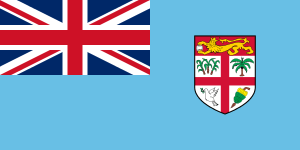 Fiji
Fiji
- English
- Fijian
- Fiji Hindi
 Finland
Finland
- Finnish (national language, official in all municipalities except in Åland Islands and three mainland municipalities)
- Swedish (national language, official in 33 mainland municipalities (mostly bilingual) and Åland Islands (monolingual))
- Sami (minority language in the municipalities of Enontekiö, Inari, Sodankylä, and Utsjoki)
 France and overseas departments and territories (Languages of France and language policy in France)[31]
France and overseas departments and territories (Languages of France and language policy in France)[31]
- French (statewide) (only official language according to French constitution)
G
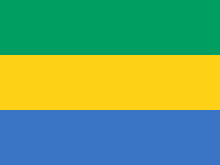 Gabon
Gabon
- French
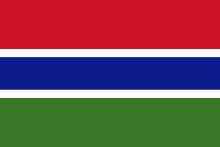 Gambia
Gambia
- English
 Germany
Germany
- German (nationwide; official)[32]
- Danish (in Schleswig-Holstein) (minority language)
- Lower Sorbian (in Brandenburg) (minority language)
- North Frisian (in Schleswig-Holstein) (minority language)
- Romani (nationwide)[33] (minority language)
- Saterland Frisian (in Lower Saxony) (minority language)
- Upper Sorbian (in Saxony) (minority language)
- German Sign Language (§6 Behindertengleichstellungsgesetz)
 Ghana
Ghana
- English (statewide; official)
- Adangme (in Greater Accra)
- Dagaare (in the Upper West Region)
- Dagbani (in the Northern Region)
- Ewe (in the Volta Region)
- Ga (in Greater Accra)
- Gonja (in the Northern Region)
- Kasem (in the Upper East Region)
- Nzema (in the Western Region)
- Twi (in Akuapem, Akyem, Ashanti, Fanteakwa, Fante, and Kwahu)
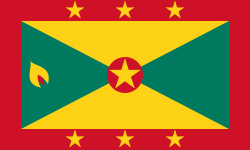 Grenada
Grenada
- English
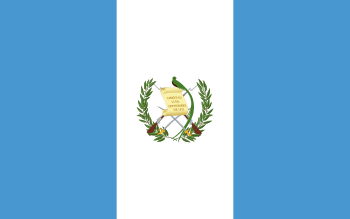 Guatemala
Guatemala
- Spanish
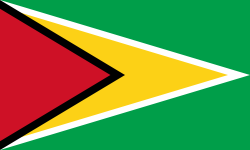 Guyana
Guyana
- English (official)
- Guyanese Creole (national)
H
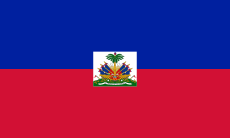 Haiti
Haiti
- French
- Haitian Creole
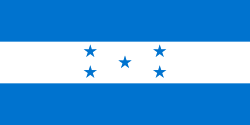 Honduras
Honduras
- Spanish (official)
- Garifuna (in the Northern Caribbean Coast)
- English (in the Bay Islands)
- Miskito (in Eastern Honduras)
I
 India (Languages with official status in India)
India (Languages with official status in India)
- English (Central Government, nationwide; only official language of Nagaland and Arunachal Pradesh)
- Hindi (Central Government, ten states, and Delhi, Chandigarh and Andaman and Nicobar Islands)
- Assamese (in Assam)
- Bengali (in West Bengal, Tripura, Andaman and Nicobar Islands and in parts of Assam)
- Bhutia (in Sikkim)
- Bodo (in Assam)
- Chhattisgarhi (in Chhattisgarh)
- Dogri (in Jammu and Kashmir)
- French (in Puducherry/Pondicherry)
- Garo (in Meghalaya)
- Gujarati (in Dadra and Nagar Haveli, Daman and Diu, and Gujarat)
- Gurung (in Sikkim)
- Kannada (in Karnataka)
- Karbi (in Assam)
- Kashmiri (in Jammu and Kashmir)
- Khasi (in Meghalaya)
- Kokborok (in Tripura)
- Konkani (in Goa)
- Lepcha (in Sikkim)
- Limbu (in Sikkim)
- Magar (in Sikkim)
- Maithili (mentioned on the 8th schedule but no region specified, spoken in Bihar)
- Malayalam (in Kerala and Puducherry)
- Meitei (in Manipur)
- Marathi (in Maharashtra, Goa, Dadra and Nagar Haveli, Daman and Diu)
- Mizo (in Mizoram)
- Nepali (in Sikkim and West Bengal)
- Newari (in Sikkim)
- Nicobarese (in Andaman and Nicobar Islands)
- Oriya (in Odisha)
- Portuguese (in Goa, Daman and Diu)
- Punjabi in the Gurumukhi script (in Punjab, Himachal Pradesh, Haryana and Chandigarh)
- Sanskrit (in Uttarakhand)
- Santali (in Jharkhand)
- Sherpa (in Sikkim)
- Sindhi (not regionally specified)
- Sunwar (in Sikkim)
- Tamang (in Sikkim)
- Tamil (in Tamil Nadu, Andaman and Nicobar Islands, and Puducherry)
- Telugu (in Andhra Pradesh, Telangana, Puducherry and Andaman and Nicobar Islands)
- Urdu (in Lucknow and Hyderabad)
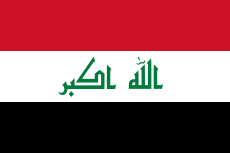 Iraq
Iraq
- Arabic (statewide)
- Kurdish (statewide)
- Assyrian Neo-Aramaic (in Assyrian areas)
- Iraqi Turkmen (in Turkmen areas)
 Ireland (Languages of Ireland)[36]
Ireland (Languages of Ireland)[36]
- English (Second national language)
- Irish (First national language; minority language)
 Italy (Languages of Italy)
Italy (Languages of Italy)
- Italian (nationwide; official)
- French (co-official in Aosta Valley)
- German (co-official in South Tyrol)
- Ladin (in South Tyrol) (minority language)
- Slovene (in the Province of Trieste and Province of Gorizia) (minority language)
 Ivory Coast
Ivory Coast
- French
J
 Japan
Japan
- Japanese (national)
 Jordan
Jordan
- Arabic (official)
K
 Kazakhstan
Kazakhstan
- Kazakh (national)
- Russian
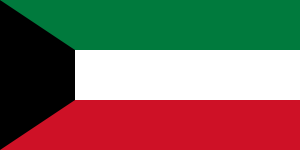 Kuwait
Kuwait
- Arabic
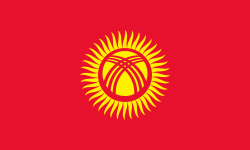 Kyrgyzstan
Kyrgyzstan
- Kirghiz (national)
- Russian
L
 Lebanon
Lebanon
- Arabic
- Armenian (regional in Bourj Hammoud)
 Liberia
Liberia
- English
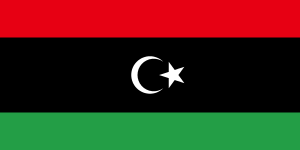 Libya
Libya
- Arabic
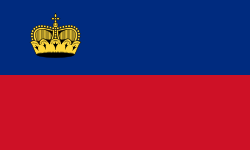 Liechtenstein
Liechtenstein
- German
 Luxembourg
Luxembourg
- French
- German
- Luxembourgish (national)
M
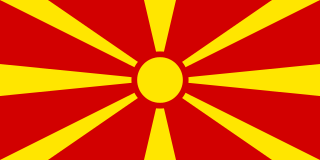 Macedonia
Macedonia
- Macedonian (statewide)
- Albanian (regional)
- Romani (regional)
- Serbian (regional
- Turkish (regional)
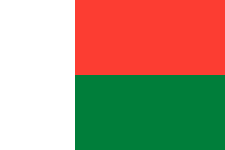 Madagascar
Madagascar
- French (official)
- Malagasy (official and national)
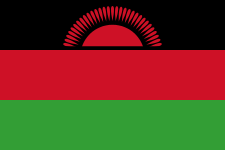 Malawi
Malawi
- Chichewa (national)
- English (official)
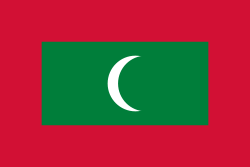 Maldives
Maldives
- Dhivehi
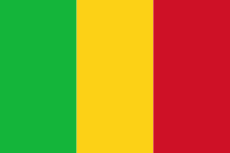 Mali
Mali
- French
- Tamazight (Azawad district)
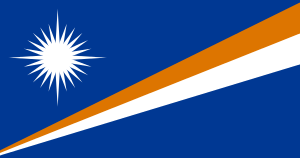 Marshall Islands
Marshall Islands
- English
- Marshallese (national)
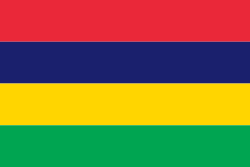 Mauritius
Mauritius
- English (official)
- French (national)
 Mexico
Mexico
- Spanish is the de facto official language, but de jure recognizes several regional minority Amerindian languages. (No official language).
 Montenegro
Montenegro
- Montenegrin (national)
- Albanian (in Ulcinj, along the eastern border with Albania)
- Bosnian (regional in the north of the country)
- Croatian (in Tivat, the Bay of Kotor area)
- Serbian (in Herceg Novi)
 Morocco
Morocco
- Arabic
- Tamazight
N
 Netherlands
Netherlands
- Dutch (de facto, statewide)
- West Frisian (in Friesland)
- Limburgish (regional language)
- Low Saxon (regional language)
- Papiamento (on Aruba, Curaçao and Bonaire)
- English (on Sint Maarten, Sint Eustatius and Saba)
 Nicaragua
Nicaragua
- Spanish
 Norway (Languages of Norway)
Norway (Languages of Norway)
- Norwegian (statewide) (Bokmål and Nynorsk are the official forms, and municipalities choose between them or a neutral stance)
- Sami (indigenous language in vast areas from Engerdal to the Russian border, official administrative language in Kautokeino, Karasjok, Gáivuotna - Kåfjord, Nesseby, Porsanger, Tana, Tysfjord, and Snåsa)
- Kven (national minority language, administrative language in Porsanger)
- Romani (national minority language)
- Scandoromani (national minority language)
O
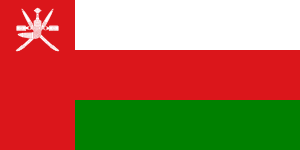 Oman
Oman
- Arabic
P
 Philippines (Languages of the Philippines , Philippine languages)
Philippines (Languages of the Philippines , Philippine languages)
- Filipino (official, statewide, national)
- English (official, statewide)
- Spanish (statewide)
- Arabic (statewide)
- Aklanon (regional in the Visayas)
- Bikol (regional in Luzon)
- Cebuano (regional in Visayas and Mindanao)
- Chavacano (regional in Mindanao)
- Hiligaynon (regional in Visayas and Mindanao)
- Ibanag (regional in Luzon)
- Ivatan (regional in Luzon)
- Ilokano (regional in Luzon)
- Ivatan (regional in Luzon)
- Kapampangan (regional in Luzon)
- Kinaray-a (regional in the Visayas)
- Maranao (regional in Mindanao)
- Maguindanao (regional in Mindanao)
- Pangasinan (regional in Luzon)
- Sambal (regional in Luzon)
- Tagalog (regional in Luzon)
- Tausug (regional in Mindanao)
- Waray-Waray (regional in the Visayas)
- Yakan (regional in Mindanao)
 Poland
Poland
- Polish (sole official language of state)
- Kashubian (recognised regional language and auxiliary language in part of Pomeranian Voivodeship)
- German (minority language and auxiliary language in part of Opole Voivodeship)
- Lithuanian (minority language and auxiliary language in Puńsk commune, Podlaskie Voivodeship)
- Belarusian (minority language and auxiliary language in part of Podlaskie Voivodeship)
 Portugal (Languages of Portugal)
Portugal (Languages of Portugal)
- Portuguese (official)
- Mirandese (regional, in Miranda do Douro)
Q
 Qatar
Qatar
- Arabic
R
 Russia (Languages of Russia)
Russia (Languages of Russia)
- Russian (federal; official)
- Abaza (in the Karachay–Cherkess Republic)
- Adyghe (in the Republic of Adygea)
- Agul (in the Republic of Dagestan)
- Altay (in the Altai Republic)
- Avar (in the Republic of Dagestan)
- Azerbaijani (in the Republic of Dagestan)
- Bashkir (in the Republic of Bashkortostan)
- Buryat (in Buryat Republic)
- Chechen (in the Chechen Republic and Republic of Dagestan)
- Chuvash (in the Chuvash Republic)
- Dargin (in the Republic of Dagestan)
- Erzya (in the Republic of Mordovia)
- Ingush (in the Republic of Ingushetia)
- Kabardian (in the Kabardino-Balkar and Karachay–Cherkess Republics)
- Kalmyk (in the Republic of Kalmykia)
- Karachay-Balkar (in the Kabardino-Balkar and Karachay–Cherkess Republics)
- Khakas (in the Republic of Khakassia)
- Komi-Zyrian (in the Komi Republic)
- Kumyk (in the Republic of Dagestan)
- Lak (in the Republic of Dagestan)
- Lezgian (in the Republic of Dagestan)
- Mari (in the Mari El Republic)
- Moksha (in the Republic of Mordovia)
- Nogai (in the Karachay–Cherkess Republic and in the Republic of Dagestan)
- Ossetic (in the Republic of North Ossetia–Alania)
- Rutul (in the Republic of Dagestan)
- Sakha (in the Sakha Republic)
- Tabasaran (in the Republic of Dagestan)
- Tatar (in the Republic of Tatarstan)
- Tati (in the Republic of Dagestan)
- Tsakhur (in the Republic of Dagestan)
- Tuvin (in the Tuva Republic)
- Udmurt (in the Republic of Udmurtia)
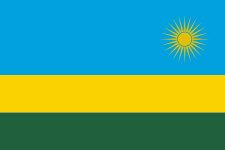 Rwanda
Rwanda
- English
- French
- Kinyarwanda
S
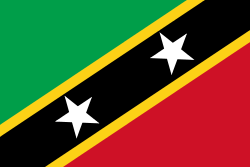 Saint Kitts and Nevis
Saint Kitts and Nevis
- English
 Saint Lucia
Saint Lucia
- English
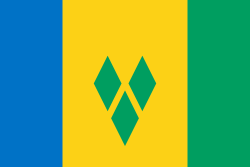 Saint Vincent and the Grenadines
Saint Vincent and the Grenadines
- English
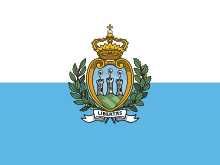 San Marino
San Marino
- Italian
 Saudi Arabia
Saudi Arabia
- Arabic
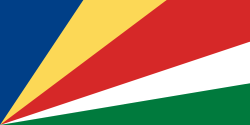 Seychelles
Seychelles
- English
- French
- Seychellois Creole
 Sierra Leone
Sierra Leone
- English
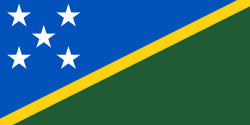 Solomon Islands
Solomon Islands
- English
 South Africa
South Africa
- Afrikaans
- English
- Southern Ndebele
- Northern Sotho
- Sotho
- Swazi
- Tsonga
- Tswana
- Venda
- Xhosa
- Zulu
- (all 11 official, statewide)
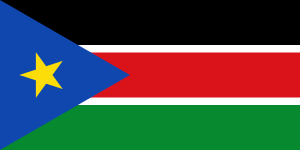 South Sudan
South Sudan
- English
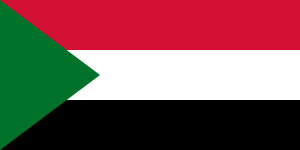 Sudan
Sudan
- Arabic
- English
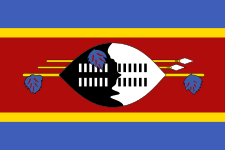 Swaziland
Swaziland
- English
- Swazi
 Sweden
Sweden
- Swedish
- Finnish (in Gällivare, Haparanda, Kiruna, Pajala, Övertorneå, and the surrounding areas) (minority language)
- Meänkieli (in Gällivare, Haparanda, Kiruna, Pajala, Övertorneå, and the surrounding areas) (minority language)
- Romani (historical minority language)
- Sami (in Arjeplog, Gällivare, Jokkmokk, Kiruna, and the surrounding areas) (minority language)
- Yiddish (historical minority language)
- Swedish Sign Language (minority language)
 Switzerland
Switzerland
- German (in Aargau, Appenzell Ausserrhoden, Appenzell Innerrhoden, Basel-Landschaft, Basel-Stadt, Bern, Fribourg, Glarus, Graubünden, Lucerne, Nidwalden, Obwalden, Saint Gallen, Schaffhausen, Schwyz, Solothurn, Thurgau, Uri, Valais, Zug, and Zürich)
- French (in Bern, Fribourg, Geneva, Jura, Neuchâtel, Valais, and Vaud)
- Italian (in Ticino and Graubünden)
- Romansh (in Graubünden)
 Syria
Syria
- Arabic
T
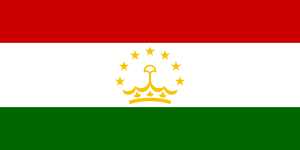 Tajikistan
Tajikistan
- Tajik (national)
- Russian (for interethnic communication)
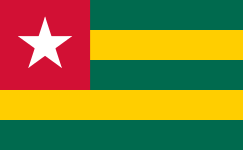 Togo
Togo
- French
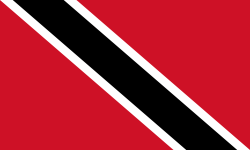 Trinidad and Tobago
Trinidad and Tobago
- English
 Tunisia
Tunisia
- Arabic (national)
 Turkmenistan
Turkmenistan
- Turkmen (national)
- Russian (for interethnic communication)
U
 United Arab Emirates
United Arab Emirates
- Arabic
 United Kingdom, British Overseas Territories and Crown dependencies
United Kingdom, British Overseas Territories and Crown dependencies
- English(official)
- In England almost all legislation is written in English, however some older statutes are in Latin and Norman French.
- Cornish(in Cornwall)[45] has been officially recognized as a language of cultural importance. It is not however an "official language" any more than is any other language.
- Irish and Ulster-Scots(in Northern Ireland)
- Scots and Scottish Gaelic (in Scotland)
- Welsh (in Wales)
- Pitcairnese (in Pitcairn Islands)
- Guernésiais and French (in Guernsey)
- Jèrriais and French (in Jersey)
- Manx (in Isle of Man)
- English(official)
- See also: Languages of the United States and English-only movement
- No official language nationwide. English is the de facto but not the de jure official language (at the federal level). Spanish is the second-most commonly used language in the U.S. and many forms and documents are published in both languages.
- English (in Alabama, Alaska, American Samoa, Arizona, Arkansas, California, Colorado, Florida, Georgia, Guam, Hawaii , Idaho, Illinois, Indiana, Iowa, Kansas, Kentucky, Louisiana, Massachusetts, Mississippi, Missouri, Montana, Nebraska, New Hampshire, North Carolina, North Dakota, Northern Mariana Islands, Oklahoma, Puerto Rico, South Carolina, South Dakota, Tennessee, US Virgin Islands, Utah, Virginia, and Wyoming)
- The 19 native languages (in Alaska)
- Hawaiian (in Hawaii)
- Cherokee (in the UKB in Oklahoma)
- Samoan (in American Samoa)
- Chamorro and Carolinian (in Northern Mariana Islands)
- Spanish (in Puerto Rico)
 Uruguay
Uruguay
- Spanish
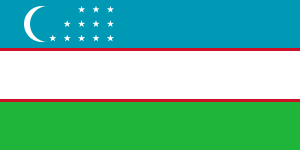 Uzbekistan
Uzbekistan
- Uzbek (national)
- Russian (for interethnic communication)
V
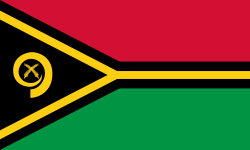 Vanuatu
Vanuatu
- Bislama (national)
- English
- French
 Vatican City
Vatican City
- Latin
- Italian (de facto—see Languages of Vatican City).
 Venezuela
Venezuela
- Spanish
Y
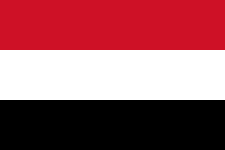 Yemen
Yemen
- Arabic
Z
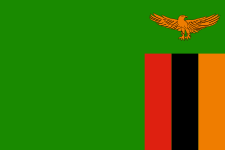 Zambia
Zambia
- English
- (English, Shona and Ndebele are the most widely spoken languages)
Partially recognised states or Impartial Sovereign
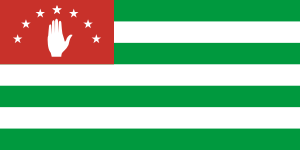 Abkhazia
Abkhazia
- Abkhazian
- Russian
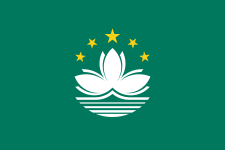 Macau
Macau
- Cantonese (de facto)
- Chinese (Traditional)
- Portuguese
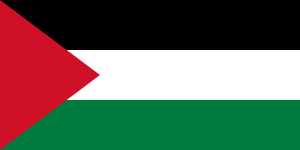 Palestine
Palestine
- Arabic
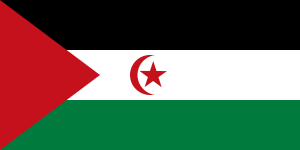 Sahrawi Arab Democratic Republic
Sahrawi Arab Democratic Republic
- Tamazight
- Arabic
- Spanish
 Sealand
Sealand
- English
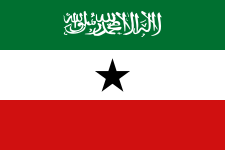 Somaliland
Somaliland
- Somalian
- Arabic
- English
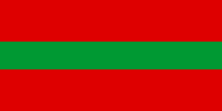 Transnistria
Transnistria
- Moldavian
- Russian
- Ukrainian
See also
References and footnotes
- ↑ Constitution of Afghanistan (Chapter 1, Article 16)
- ↑ Constitution of Albania (Article 14)
- ↑ Constitution of Algeria (Article 3) (MS Word format)
- ↑ Constitution of Andorra (Article 2)
- ↑ "Angola". The World Factbook. Central Intelligence Agency.
- ↑ Constitution of Antigua and Barbuda, 1981 (Article 29)
- ↑ Provincial Law Nº5598
- ↑ Constitution of Armenia (Article 12)
- ↑ Constitution of Austria (Article 8)
- ↑ 10.0 10.1 Constitution of Austria, Article 8 & State Treaty for the Re-establishment of an Independent and Democratic Austria (Article 7, Page 188)
- ↑ Constitution of Azerbaijan, Constitution of Azerbaijan (English translation) (Article 21)
- ↑ Constitution of Belgium, in Dutch, French and German (Article 4)
- ↑ Footitt, Hilary; Kelly, Michael (2012). Languages at War: Policies and Practices of Language Contacts in Conflict. Basingstoke: Palgrave Macmillan. pp. 111–120. ISBN 0230368778.
- ↑ Pomerode institui língua alemã como co-oficial no Município.
- ↑ Pomerano!?, acessado em 21 de agosto de 2011
- ↑ No Brasil, pomeranos buscam uma cultura que se perde, acessado em 21 de agosto de 2011
- ↑ Lei dispõe sobre a cooficialização da língua pomerana no município de Santa maria de Jetibá, Estado do Espírito Santo
- ↑ Cooficialização da língua alemã em Antônio Carlos
- ↑ Vereadores aprovam o talian como língua co-oficial do município, acessado em 21 de agosto de 2011
- ↑ Lei municipal oficializa línguas indígenas em São Gabriel da Cachoeira, acessado em 24 de agosto de 2011
- ↑ Na Babel brasileira, português é 2ª língua – FLÁVIA MARTIN e VITOR MORENO, enviados especiais a Sâo Gabriel da Cachoeira (AM), acessado em 24 de agosto de 2011
- ↑ Município do MS adota o guarani como língua oficial, acessado em 24 de agosto de 2011
- ↑ Indigenal Act, art. 28
- ↑ Constitution of Colombia, 1991 (Article 10)
- ↑ 25.0 25.1 The Constitution of the Republic of Cyprus (PDF). 1960. art. 3, § 1.
- ↑ 26.0 26.1 "Implementation of the Charter in Cyprus", Database for the European Charter for Regional or Minority Languages (Public Foundation for European Comparative Minority Research), retrieved 11 August 2013
- ↑ Slovak language is defined as official language together with Czech language by several laws – e.g. law 500/2004, 337/1992. Source: http://portal.gov.cz. Cited: "Například Správní řád (zákon č. 500/2004 Sb.) stanovuje: "V řízení se jedná a písemnosti se vyhotovují v českém jazyce. Účastníci řízení mohou jednat a písemnosti mohou být předkládány i v jazyce slovenském..." (§16, odstavec 1). Zákon o správě daní a poplatků (337/1992 Sb.) „Úřední jazyk: Před správcem daně se jedná v jazyce českém nebo slovenském. Veškerá písemná podání se předkládají v češtině nebo slovenštině..." (§ 3, odstavec 1). http://portal.gov.cz
- ↑ 28.0 28.1 28.2 28.3 28.4 28.5 28.6 28.7 28.8 28.9 28.10 28.11 28.12 Citizens belonging to minorities, which traditionally and on long-term basis live within the territory of the Czech Republic, enjoy the right to use their language in communication with authorities and in front of the courts of law (for the list of recognized minorities see National Minorities Policy of the Government of the Czech Republic). The article 25 of the Czech Charter of Fundamental Rights and Basic Freedoms ensures right of the national and ethnic minorities for education and communication with authorities in their own language. Act No. 500/2004 Coll. (The Administrative Rule) in its paragraph 16 (4) (Procedural Language) ensures, that a citizen of the Czech Republic, who belongs to a national or an ethnic minority, which traditionally and on long-term basis lives within the territory of the Czech Republic, have right to address an administrative agency and proceed before it in the language of the minority. In case that the administrative agency doesn't have an employee with knowledge of the language, the agency is bound to obtain a translator at the agency's own expense. According to Act No. 273/2001 (About The Rights of Members of Minorities) paragraph 9 (The right to use language of a national minority in dealing with authorities and in front of the courts of law) the same applies for the members of national minorities also in front of the courts of law.
- ↑ 29.0 29.1 Constitution of Timor-Leste, section 13.
- ↑ 30.0 30.1 30.2 Constitution of Ecuador 2008, (Article 2)
- ↑ Constitution of France (Article 2)
- ↑ Though not explicitly specified in the constitution, this is regulated in §23 Verwaltungsverfahrensgesetz (Administrative Procedures Act)
- ↑ Publication by Ministry of the Interior (in German)
- ↑ Constitution of Hungary, Article H - www.kormany.hu/download/4/c3/30000/THE%20FUNDAMENTAL%20LAW%20OF%20HUNGARY.pdf
- ↑ 35.0 35.1 35.2 35.3 35.4 35.5 Recognized by Hungary as minority language by the Ratification of the European Charter for Regional or Minority Languages by the Hungarian Parliament - Resolution 35/1995, April 7, 1995 - http://www.complex.hu/kzldat/o95h0035.htm/o95h0035_0.htm
- ↑ Constitution of Ireland (Article 8)
- ↑ The Constitution of Jamaica section 20(6e) (implicit)
- ↑ Priedīte, Aija (2005). "Surveying Language Attitudes and Practices in Latvia". Journal of Multilingual and Multicultural Development 26 (5): 409–424. doi:10.1080/01434630508668413.<quote>In 1992, following further amendments to this directive, Latvian was established as the only official language. It took 410 Journal of Multilingual and Multicultural Development seven more years before the State language law was adopted in 1999, with further amendments in the years 2000, 2001 and 2002.</quote>
- ↑ Jarinovska, Kristine. "Popular Initiatives as Means of Altering the Core of the Republic of Latvia", Juridica International. Vol. 20, 2013. p. 152 ISSN1406-5509
- ↑ 40.0 40.1 Article 152 of the Constitution of Malaysia designated Malay as the national language. Section 2 of that article allowed English to be used officially until otherwise provided by Parliament. In 1967, the Parliament of Malaysia passed the National Language Act, making Malay the official language of Malaysia. The act does, however, allow the use of English for some official purposes. On 11 July 1990, following the amendment of the National Language Act 1963/67 (Act 32) (Revised in 1971), Malay replaced English as the official language of the courts in West Malaysia. The amending Act provided English to be used in the Courts in West Malaysia where it deems necessary in the interest of Justice. East Malaysia continued using English as the official language in their courts.[41] Since 2007, the official policy is to refer to the national language as the Malaysian language (Bahasa Malaysia), although legislation still refers to the Malay language (Bahasa Melayu).
- ↑ Malaysia's Legal System, Eurasia International Legal Network, Malaysia.
- ↑ Constitution of Monaco (Article 8)
- ↑ "Article 3 – Language". The Constitution of The Republic of Namibia. orusovo.com. Retrieved 23 April 2008.
- ↑ https://www.cia.gov/library/publications/the-world-factbook/geos/wa.html 32% Namibians speak German
- ↑ "Cornish gains official recognition". BBC News. 6 November 2002. Retrieved 8 May 2008.
- ↑ "Taiwan Information: People and Language". Asia-planet.net (Information provided by Tourism Bureau, ROC). Retrieved 30 August 2009.
| |||||||||||||||||||||||||||||||||||||||||||||||||||||||||||||||||||